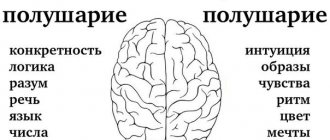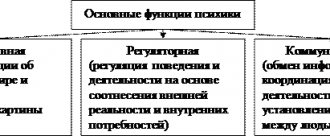Mental processes are a conditional division of the psyche into component elements that allow us to cognize the external and internal world. This is such a complex phenomenon and so little is known about it that there are quite a few definitions and interpretations of this phenomenon.
The development of mental processes occurs in specific conditions of interaction with the outside world: the special properties of our planet, the transition from winter to summer, changes in gravity and much more - put forward certain requirements for a person. Therefore, the psyche acts as a regulator of the body’s behavior.
The functions of mental processes depend entirely on the species. All mental processes can be divided into three types:
Cognitive:
- perception;
- memory;
- thinking;
- sensation;
- imagination;
- performance;
- speech;
- attention.
Emotional:
- feelings;
- emotions;
- stress;
- affects.
Strong-willed:
- will;
- goal setting;
- decision-making.
There is also an inseparable interconnection of mental processes, which is expressed, for example, in the fact that memory is impossible without attention, perception is impossible without memory, and so on. Therefore, if you want to improve the functioning of your mental processes, it will be enough to develop several of them. For example, memory, imagination, emotions and will. However, your list may be completely different. In any case, it should not surprise you that by developing your attention, all other processes immediately “catch up”.
Study methods
In the field of psychiatry and cognitive science, the following methods are used to study the processes of memory, perception, thinking, attention and other functions:
- Recognizing figures by touch and manipulating them tactilely (Seguin board).
- Visual recognition of real, noisy, contour and defocused images (Poppelreiter test).
- Perception of objects requiring visual-spatial processing (contour geographical map, schematic clock).
- Recognizing familiar portraits of famous people.
- Listening perception and assessment of rhythmic structures.
- Detection of memory impairments (Pictogram technique).
It should be said that it is possible to identify a violation of the mental process only with the help of several methods, that is, problems need to be diagnosed in a complex manner.
The largest number of techniques explore thinking. The most famous is “Classification of Objects”, where it is possible to study various aspects of the thinking process. Also known: understanding the figurative meaning of metaphors and proverbs, solving arithmetic problems of varying degrees of complexity, comparing and defining concepts.
Now let's talk separately about the course of mental processes and states, their characteristics, properties and functions.
Psychic phenomena
The most common mental processes were listed above, but let's look at these lists in more detail. They vary greatly among different authors. Common and noted by all are attention, emotions, memory, feelings, sensations, will, thinking, perception, speech. In the category of mental phenomena, they are accessible to any direct and unqualified observation.
Most often, what is interesting is not even the observed process itself, but its deviations from the norm, that is, its characteristics. Here, the usual table of features of mental processes usually helps students understand the classification. Children of all categories are studied especially carefully, but even their cognitive processes can be quite easily distinguished from emotional or volitional processes.
Mental cognitive processes
Let's consider each process separately.
1
Perception
Perception is a holistic reflection of objects and phenomena in the totality of their properties and parts with their direct impact on the senses. It occurs in close relationship with other mental processes: first of all, with sensations that, with the help of sensors, collect information from the outside world, and secondly, with memory, will and attention. Perception is the interpretation of what our sensors have collected.
Perceptual properties include:
- Structurality: an object is perceived by consciousness as a simulated structure abstracted from sensations.
- Objectivity: objects are perceived not as an incoherent set of sensations, but as images that make up specific objects.
- Constancy: constancy of perception of the same object.
- Apperception: perception is influenced by the general content of the human psyche.
- Selectivity: preferential selection of some objects over others (perception here works closely with attention).
2
Memory
Memory is a complex of cognitive abilities for the accumulation, preservation and reproduction of knowledge and skills. Memory is closely related to thinking, perception and sensations.
The main function of memory is to store information, which a person can then use for certain purposes. Without it, we would not have an identity.
The properties of memory include: volume, accuracy, speed of memorization and forgetting processes.
There are different typologies of memory:
- By content: spatial, social, emotional, eidetic, sensory, verbal-logical, figurative.
- By sensory modality: motor, visual, gustatory, auditory, olfactory, eidetic, pain.
- By storage time: long-term, short-term, ultra-short-term.
- According to the organization of memorization: declarative and procedural.
- According to the presence of a goal: voluntary and involuntary.
3
Thinking
Thinking is the process of modeling the patterns of the surrounding world, the highest stage of human information processing. We can say that this is the final mental process that guides the personality.
With the help of thinking, a person can completely change his perception, imagination, attention, will and even sensations. The highest degree of human knowledge.
Basic characteristics of thinking:
- Indirect cognition of objective reality: even on the basis of indirect information we can judge the properties of objects and phenomena.
- Generalization of the reflection of reality: the transition from individual objects to the general.
4
Feel
Sensation is a mental reflection of individual properties and states of the external environment, subjects of external or internal stimuli with the participation of the nervous system.
Canonically, there are five types of sensations: smell, taste, touch, vision, hearing.
Properties of sensations:
- Intensity: a quantitative characteristic of sensations.
- Modality: qualitative description of sensations.
- Duration: temporary characteristic of sensations.
- Localization: spatial characteristics of sensations, information about the location of the stimulus in space.
5
Imagination
Imagination is a person’s ability to create images, ideas and ideas in the mind, as well as to manipulate them. The functions of imagination are to imagine in the head a sample of the future result of an activity in planning, searching for a strategy for solving problems.
Properties of imagination:
- Dream: an emotional image of a desired future that is characterized by little knowledge of how to make it a reality.
- Creativity: creation of new spiritual and material values.
- Agglutination: the creation of new images based on “gluing together” parts of existing images.
- Hallucination: unreal images that a person experiences during illness.
- Emphasis: creating new images by highlighting and emphasizing certain features.
6
Performance
A representation is an image of a phenomenon or object that a person does not perceive here and now. It differs from imagination in that a person is simply trying to remember the image, and not come up with something new.
The functions of representation depend on the type of human activity: artists need to remember the desired image, musicians need to remember the desired melody or sound. Imagination helps to solve complex and imaginative problems, including creative ones.
View properties:
- Fragmentation. The more attractive an object was to a person, the more detail he can imagine it.
- Visibility. A person represents the image of a perceived object exclusively in visual form.
- Generality. The image of an object has a certain information capacity.
- Instability. The image can only be held for a certain amount of time.
7
Speech
Speech is a form of communication between people through linguistic structures. Inherently connected with thinking and presentation.
It helps convey important information to us, as well as convey socio-historical experience.
Properties of speech:
- Clarity. Syntactically correct construction of sentences, the ability to correctly pause or place logical emphasis on the right word.
- Content. The percentage of valuable words expressed in relation to those that are not valuable (the so-called “water”).
- Effectiveness. The influence of speech on the thoughts, will and feelings of other people.
- Expressiveness. Emotional richness, richness and variety of linguistic means.
8
Attention
Attention is the selective focus of perception on a particular object. It is very closely related to memory (some cognitive scientists believe that this is one and the same thing), as well as will.
With the help of will, a person can change his attitude towards an object and pay conscious attention to it, that is, highlight it from the rest. Attention helps a person to successfully navigate the world around him.
By the properties of attention one should mean: volume, direction, concentration, distribution, intensity, switchability and stability.
Structure and functions
Cognitive processes in psychology are considered the “youngest”. Even the centers of these processes are located in the neocortex - the youngest part of the cerebral cortex, with the exception of the centers of attention and memory.
However, these processes are at the same time extremely important for humans, since they perform a number of necessary functions:
- Reception of new information and its differentiation, for which there are different channels of information (visual, auditory, olfactory, etc.).
- Processing primary information and creating holistic subjective images.
- Data storage.
- Establishing connections between different types of sensory information, concepts, images, as well as connections between new information and existing information.
- Creation of concepts and signs, establishment of patterns between phenomena and processes of the surrounding world; signs are also used for communication, which is the basis of speech.
- Creating a strategy of behavior and its motives.
- Formation of goals and long-term objectives of activity.
- The ability to foresee the results of actions and plan one’s behavior.
A person's level of intelligence is determined by how effectively his cognitive processes perform their functions. Understanding the world around us, of course, does not happen spontaneously and chaotically.
It has a certain structure and consists of several stages
:
- First, the brain receives new information and processes the received data.
- Then he uses methods of analysis, synthesis, comparison and generalization.
- The information received is remembered and saved.
- From the information received, new information is created - in the form of images and concepts.
- Finally, at the highest level of cognition, complex operations with data, including those of a predictive nature, are carried out.
Mental emotional processes
Let's consider each process separately.
1
Feelings
Feeling is a human emotional process that reflects a subjective evaluative attitude towards abstract or real objects. Feelings manifest differently among people because they are influenced by their own set of individual traits and personality traits. Necessary for communication, friendship and understanding of other people.
Properties of feelings:
- Content: reflection of various aspects, features of the meaning of the objects that cause them.
- Sthenicity: sthenic feelings mobilize a person’s strength, encourage him to active activity (hate, love). Asthenic paralyzes and relaxes (contempt and fear).
- Intensity: strength of feeling.
- Valence: pleasant, unpleasant and ambivalent feelings.
2
Emotions
Emotions reflect a subjective evaluative attitude towards objects, phenomena, situations and people. With the help of will, a person can evoke any emotion that he deems necessary.
The properties of emotions completely coincide with the properties of feelings.
3
Stress
Stress is a set of adaptive reactions of the psyche to stressors.
There is positive (eustress) and negative (distress) stress. The difference is in intensity: the more of it in the psyche, the worse.
4
Affects
Affects are emotional processes of an explosive nature. In many cases they are considered a negative manifestation of the psyche, but in a threatening situation they can save lives.
Mental volitional processes
Let's consider each process separately.
1
Setting a goal
Goal setting is the process of selecting one or more goals. Closely related to willpower and emotions.
2
Will
Will is the ability of a person to make a decision based on the thought process and direct his actions and thoughts in accordance with the decision made.
As follows from the definition, will is closely related to thinking and decision-making. But, besides this, without it conscious attention and developed memory are impossible.
3
Making decisions
Decision making is a mental process that is characterized by the use of willpower to set a goal and a firm intention to achieve it.
Study and researchers
For the first time people started talking about mental manifestations in antiquity, but the study of mental processes began in the 19th century.
As we studied, several concepts emerged:
- Representatives of the direction formed by Jean Piaget conducted many experiments and studies, during which they found that higher mental functions develop during life, but this process stops in adolescence. Development stops completely when the morphological maturation of the organism ends.
- L.S. Vygotsky developed a different concept. According to her, the development of mental functions continues throughout life. It is associated with the influence of environmental factors, the influence of society, and hereditary predispositions.
Representatives of Gestalt psychology claim that any mental processes do not develop throughout life, but appear at certain stages of growing up, but this statement was quickly refuted.
Development of mental processes
When they talk about the development of mental processes in children, the first thing they distinguish is their age group.
From 2 to 6 years of age, the child develops mental processes. Parents can influence this if they coach them. Here are exercises you can give your children:
- Place some toys on the table. The child must remember their location and presence. Then he closes his eyes and you remove or move one of them. He must say what has changed.
- When your child has mastered this exercise, make it more difficult. Remove 2 or 3 toys.
- The following game is suitable for developing thinking: place four pictures in front of the child, where three of them relate to a specific topic. The child must guess which one is extra.
- When going to the store, give your child a list of products (3-4 to start with) to memorize. In the store he must remember them (long-term memory is trained).
If your child is 7-8 years old, he should be able to:
- Find 10 differences between objects.
- Complete the task without distraction for about 15-20 minutes.
- Copy a movement or pattern exactly.
- Complete tasks independently according to the proposed sample.
- Be able to find identical objects.
- Be able to sequence events and compose a coherent story using pictures.
- Build a logical series from a specific group of objects.
- Repeat verbatim sentences consisting of 7-8 words.
The mental processes of an adult are formed at the age of 16. But this does not mean that they cannot be trained and improved. In fact, thinking can and even needs to be developed throughout life. Therefore, in conclusion of the article, we suggest that you take one of our courses (or all of them):
- Memory development
- Logical thinking.
- Emotional intellect.
- Cognitive science
Also, be sure to practice by solving problems from our “Games, Challenges and Entertainment” section.
We wish you good luck!
We also recommend reading:
- Storytelling
- Sensation and perception
- Cognitive sphere of personality
- Cognitive processes
- Intelligence and its development: several recommendations
- Two important laws of memory
- Cognitive psychology and cognitive psychotherapy
- Human attention: what it is and how it works
- Exercises for memory development in preschoolers
- Properties of mental states
- Spheres of personality
Key words:1Self-knowledge











